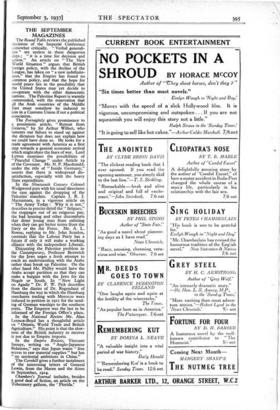THE SEPTEMBER MAGAZINES The Round Table reviews the published decisions
of the Imperial Conference somewhat critically. " Verbal generali-
ties are useless in these dangerous days ; " it is a time for decision and action." An article on " The New World Situation " argues that British foreign policy, with the decline of the League, has taken on " a new indefinite- ness," that the Empire has found no common policy, and that the hope for world peace lies in the possibility that the United States may yet decide to co-operate with the other democratic nations. The Palestine Report is warmly commended, with the reservation that all the Arab countries of the Middle East must somehow be induced to join in a Customs Union if not a political association.
The Fortnightly gives prominence to a pessimistic article, " Retreat from Geneva," by. Sir Arthur Willem who laments our failure to stand up against the dictators but does not explain how we could have done so. He looks for a trade agreement with America as a first step towards a general economic revival which might abate the fears of war. Lord Lytton examines the possibilities of " Peaceful Change " under Article 19 of the Covenant. Mr. N. P. Macdonald, under the title of " Inside Germany," asserts that there is widespread dis- satisfaction, especially with the heavy State, expenditure.
In the Nineteenth Century Colonel Wedgwood puts with his usual directness the case against the dropping of the Palestine mandate. Captain J. R. J. Macnamara' in a vigorous article on " The Army Today : Why it is not," describes in precise detail the " fatigues," the stoppages out of an exiguous pay, the bad housing and other discomforts that deter young men from enlisting when they can get better terms from the Navy or the Air Force. Mr. A. L. Rowse, replying to Mr. John Scanlon, contends that the Labour Party has a future if only it will make a working alliance with the independent Liberals.
Discussing the Palestine problem in the Contemporary, Professor Bentwich for the Jews urges a fresh attempt to reach an understanding with the Arabs rather than break up Palestine. On the other hand Mr. Philby would have the Arabs accept partition so that they can make a bargain with the Jews for the Negeb or South. In " New Light on Agadir " Dr. F. W. Pick describes from the diaries of Dr. Regeruinn7 of Hamburg the way in which the Hamburg merchants trading with Morocco were induced to petition in 1911 for the send- ing of German warships to the southern ports. The Emperor was the last to be informed of the Foreign Office's plans.
In the National Review Mr. Alan Lennox-Boyd has a thoughtful article on " Ottawa, World Trade and British Agriculture." His point is that the slow- ness of the British industry to recover is not due to Empire imports.
In the Empire Review, Viscount Inouye, writing on " Anglo-Japanese Relations," says that Japan wants " free access to raw material supplies " but has " no territorial ambitions in China."
The Cornhill gives a further instalment of the interesting letters of General Lewin, from the Marne and the Aisne in September, 1914.
Chambers's Journal includes, besides a good deal of fiction, an article on the Tobermory galleon, the ' Florida.'










































 Previous page
Previous page